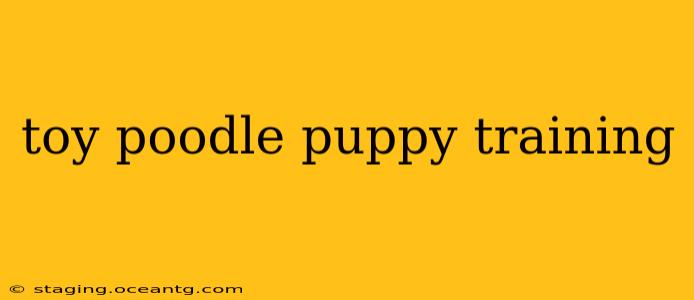Toy Poodles, with their charming personalities and fluffy coats, make wonderful companions. However, their small size doesn't mean they're any less demanding when it comes to training. Early socialization and consistent training are key to raising a well-behaved and happy Toy Poodle. This comprehensive guide will cover everything you need to know about toy poodle puppy training, from potty training to advanced commands.
Getting Started: Essential Supplies for Toy Poodle Puppy Training
Before you dive into training, gather the necessary supplies. These will make the process smoother and more effective:
- High-quality puppy food: Choose a food formulated for small breeds to ensure proper nutrition.
- Food and treat rewards: Small, soft treats are ideal for rewarding good behavior. Avoid anything that could be a choking hazard.
- Comfortable collar and leash: Opt for a lightweight and properly fitting collar and leash. Harnesses can also be useful, especially for smaller pups.
- Puppy pads (for potty training): These are helpful during the initial stages of house training.
- Crate (optional but recommended): A crate can provide a safe and secure space for your puppy, aiding in potty training and preventing destructive behavior.
- Toys: A variety of toys will keep your puppy entertained and help prevent boredom.
How to Potty Train a Toy Poodle Puppy?
Potty training is often the first challenge for new puppy owners. Consistency and patience are crucial:
- Establish a routine: Take your puppy outside frequently, especially after waking up, eating, and playing.
- Reward successes: Immediately praise and reward your puppy when they eliminate outdoors.
- Clean up accidents thoroughly: Use an enzymatic cleaner to remove the scent of urine and feces, preventing your puppy from returning to the same spot.
- Supervise your puppy: Keep a close eye on your puppy, especially during playtime, to prevent accidents.
- Use puppy pads (initially): While not ideal long-term, pads can be a transitional tool. Gradually move the pads closer to the door leading outside.
- Be patient: Accidents will happen. Don't punish your puppy; instead, focus on positive reinforcement.
What are some common potty training mistakes to avoid?
Avoid punishing your puppy for accidents after they've already happened. This can create fear and anxiety, hindering the training process. Instead, focus on preventing future accidents through consistent supervision and frequent trips outside. Also, avoid inconsistent routines, which will confuse your puppy and slow down progress.
Socialization: A Crucial Aspect of Toy Poodle Training
Early socialization is essential for your Toy Poodle's development. Expose your puppy to various sights, sounds, people, and other animals in a controlled and positive manner. This helps them develop into well-adjusted adults.
Basic Obedience Training for Toy Poodles
Start with basic commands like "sit," "stay," "come," and "down." Use positive reinforcement methods, such as treats and praise, to motivate your puppy. Keep training sessions short and fun, ending on a positive note.
What are the best training methods for a Toy Poodle?
Positive reinforcement, using treats and praise, is the most effective method for training Toy Poodles. Avoid punishment-based training, which can be detrimental to your puppy's emotional well-being and can damage your bond. Focus on rewarding good behavior instead of punishing bad behavior.
How long does it take to train a Toy Poodle?
Training a Toy Poodle, like any dog, is an ongoing process. While basic commands can be mastered within a few months with consistent effort, ongoing training and socialization are crucial throughout their lives. Consistency is key – short, regular sessions are more effective than infrequent, long ones.
Addressing Common Behavioral Issues in Toy Poodles
Toy Poodles, like all breeds, can develop behavioral issues. Some common problems include excessive barking, nipping, and separation anxiety. Addressing these issues early on is essential. Professional help from a certified dog trainer might be necessary for more challenging behaviors.
My Toy Poodle is excessively barking. What can I do?
Excessive barking can be addressed through training and identifying the root cause. Is your dog barking out of boredom, anxiety, or to alert you to something? Addressing the underlying issue, along with training commands like "quiet," can help reduce barking. Consider puzzle toys or increased exercise to address boredom.
My Toy Poodle is nipping. How can I stop this?
Nipping is common in puppies, but it needs to be addressed early on. A firm "no" combined with ignoring the puppy (removing yourself from the situation) can be effective. Provide plenty of appropriate chew toys to satisfy their chewing instinct. Never hit or punish your dog.
Conclusion: A Lifetime of Learning
Training your Toy Poodle puppy is a rewarding experience. Through patience, consistency, and positive reinforcement, you can help your furry friend become a well-behaved and confident companion. Remember that training is a lifelong journey, and continuous learning and positive reinforcement will strengthen your bond and ensure a happy and fulfilling life together.
